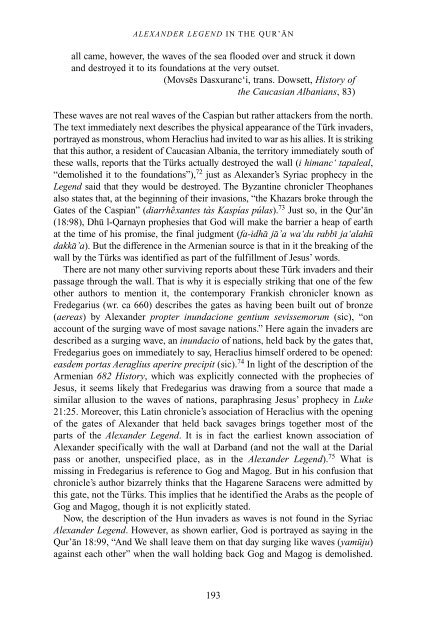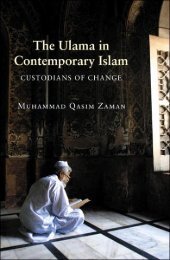The Qur'an in its historical context (pdf - Islam and Christian-Muslim ...
The Qur'an in its historical context (pdf - Islam and Christian-Muslim ...
The Qur'an in its historical context (pdf - Islam and Christian-Muslim ...
You also want an ePaper? Increase the reach of your titles
YUMPU automatically turns print PDFs into web optimized ePapers that Google loves.
ALEXANDER LEGEND IN THE QUR’AN<br />
all came, however, the waves of the sea flooded over <strong>and</strong> struck it down<br />
<strong>and</strong> destroyed it to <strong>its</strong> foundations at the very outset.<br />
(Movses Dasxuranc‘i, trans. Dowsett, History of<br />
the Caucasian Albanians, 83)<br />
<strong>The</strong>se waves are not real waves of the Caspian but rather attackers from the north.<br />
<strong>The</strong> text immediately next describes the physical appearance of the Türk <strong>in</strong>vaders,<br />
portrayed as monstrous, whom Heraclius had <strong>in</strong>vited to war as his allies. It is strik<strong>in</strong>g<br />
that this author, a resident of Caucasian Albania, the territory immediately south of<br />
these walls, reports that the Türks actually destroyed the wall (i himanc‘ tapaleal,<br />
“demolished it to the foundations”), 72 just as Alex<strong>and</strong>er’s Syriac prophecy <strong>in</strong> the<br />
Legend said that they would be destroyed. <strong>The</strong> Byzant<strong>in</strong>e chronicler <strong>The</strong>ophanes<br />
also states that, at the beg<strong>in</strong>n<strong>in</strong>g of their <strong>in</strong>vasions, “the Khazars broke through the<br />
Gates of the Caspian” (diarrhéxantes tàs Kaspías púlas). 73 Just so, <strong>in</strong> the Qur’an<br />
(18:98), Dhu l-Qarnayn prophesies that God will make the barrier a heap of earth<br />
at the time of his promise, the f<strong>in</strong>al judgment (fa-idha ja’a wa‘du rabbi ja‘alahu<br />
dakka’a). But the difference <strong>in</strong> the Armenian source is that <strong>in</strong> it the break<strong>in</strong>g of the<br />
wall by the Türks was identified as part of the fulfillment of Jesus’ words.<br />
<strong>The</strong>re are not many other surviv<strong>in</strong>g reports about these Türk <strong>in</strong>vaders <strong>and</strong> their<br />
passage through the wall. That is why it is especially strik<strong>in</strong>g that one of the few<br />
other authors to mention it, the contemporary Frankish chronicler known as<br />
Fredegarius (wr. ca 660) describes the gates as hav<strong>in</strong>g been built out of bronze<br />
(aereas) by Alex<strong>and</strong>er propter <strong>in</strong>undacione gentium sevissemorum (sic), “on<br />
account of the surg<strong>in</strong>g wave of most savage nations.” Here aga<strong>in</strong> the <strong>in</strong>vaders are<br />
described as a surg<strong>in</strong>g wave, an <strong>in</strong>undacio of nations, held back by the gates that,<br />
Fredegarius goes on immediately to say, Heraclius himself ordered to be opened:<br />
easdem portas Aeraglius aperire precipit (sic). 74 In light of the description of the<br />
Armenian 682 History, which was explicitly connected with the prophecies of<br />
Jesus, it seems likely that Fredegarius was draw<strong>in</strong>g from a source that made a<br />
similar allusion to the waves of nations, paraphras<strong>in</strong>g Jesus’ prophecy <strong>in</strong> Luke<br />
21:25. Moreover, this Lat<strong>in</strong> chronicle’s association of Heraclius with the open<strong>in</strong>g<br />
of the gates of Alex<strong>and</strong>er that held back savages br<strong>in</strong>gs together most of the<br />
parts of the Alex<strong>and</strong>er Legend. It is <strong>in</strong> fact the earliest known association of<br />
Alex<strong>and</strong>er specifically with the wall at Darb<strong>and</strong> (<strong>and</strong> not the wall at the Darial<br />
pass or another, unspecified place, as <strong>in</strong> the Alex<strong>and</strong>er Legend). 75 What is<br />
miss<strong>in</strong>g <strong>in</strong> Fredegarius is reference to Gog <strong>and</strong> Magog. But <strong>in</strong> his confusion that<br />
chronicle’s author bizarrely th<strong>in</strong>ks that the Hagarene Saracens were admitted by<br />
this gate, not the Türks. This implies that he identified the Arabs as the people of<br />
Gog <strong>and</strong> Magog, though it is not explicitly stated.<br />
Now, the description of the Hun <strong>in</strong>vaders as waves is not found <strong>in</strong> the Syriac<br />
Alex<strong>and</strong>er Legend. However, as shown earlier, God is portrayed as say<strong>in</strong>g <strong>in</strong> the<br />
Qur’an 18:99, “And We shall leave them on that day surg<strong>in</strong>g like waves (yamuju)<br />
aga<strong>in</strong>st each other” when the wall hold<strong>in</strong>g back Gog <strong>and</strong> Magog is demolished.<br />
193



